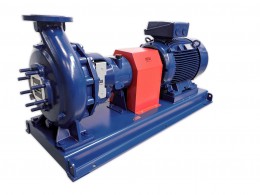Centrifugal Pumps
The operating principal of the centrifugal pump is one of the most common principals and can be deployed in situation where thin liquids of up to a viscosity of approx. 300 mPa.s. have to be pumped.
There are many different types of impellers including: closed impellers, half open impellers, entirely open impellers, recessed impellers, peripheral impellers and side entry impellers. Each impeller type has its own specific characteristics.
A distinction is also made between standard-priming and self-priming centrifugal pumps. In both cases the impeller must always be below the water level, however, self-priming centrifugal pumps are better for air processing and are often constructed so that liquid remains in the pump house so the pumps can be stationed above the level of the liquid.
A critical point for centrifugal pumps is always their mechanical seal. These are made in various versions. For chemically aggressive liquids a magnet driven pump is often selected which are hermetically sealed from the atmospere.
Vind de juiste pomp met onze pompselector
Op zoek naar de juiste capaciteit of maximale temperatuur, op basis materiaal of van een bepaald medium? Door het invullen van de pompselector, kunt u de juiste pompen voor uw toepassing vinden.
Naar pompselectieRefine by type
Refine by application
- Tankcleaning
- Biogas plants
- Chemicals
- Industrial wastewater and wastewater treatment
- Loading and unloading trucks
- Machine and equipment construction (OEM)
- Meat processing industry
- Paper and cardboard industry
- Petrochemistry
- Potato processing industry
- Process and cooling water
- Reversed Osmosis (RO)
- Shipping and dredging industry
- Slaughterhouses
- Surface treatment
- Thermal oil


